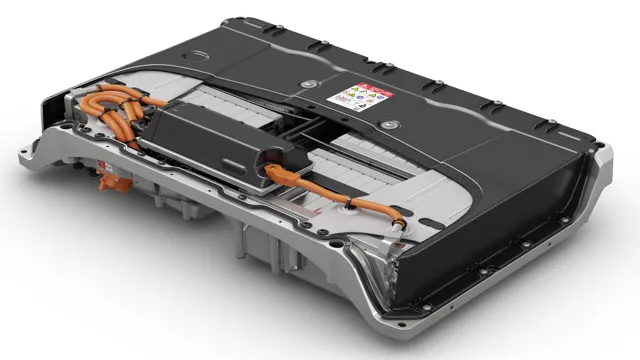Uncover the Secret to Prolonging Electric Car Battery Life: A Comprehensive Guide
Electric cars have become increasingly popular in recent years, as people search for more sustainable and eco-friendly modes of transportation. However, one of the major concerns for electric car owners is the battery life and how long it will last. After all, electric car batteries are an expensive piece of equipment and the thought of having to replace it after just a few years can be daunting.
But how long can electric car batteries actually last? And what can owners do to prolong their lifespan? In this blog, we’ll take a deep dive into the topic of electric car batteries life and explore some tips on how to get the most out of your electric car battery. So buckle up and let’s start exploring!
Introduction
Electric car batteries have come a long way in recent years, but one question on the minds of many consumers is the overall lifespan of these energy sources. With advances in technology, manufacturers have been able to create batteries that can last for hundreds of thousands of miles before needing a replacement. However, various factors can influence the life of an electric car battery, such as the type of vehicle, driving habits, and charging patterns.
It’s crucial to keep a close eye on the battery’s health, as any decline in performance can significantly affect the car’s overall range and efficiency. By taking the necessary steps to maintain and care for the battery properly, electric car owners can enjoy the benefits of their eco-friendly vehicles for years to come, confident in the durability and longevity of their battery.
What is electric car battery life
Electric car battery life is one of the primary concerns of potential buyers in the market today. With the increasing awareness of the impact of transportation on the environment, many people are switching to electric cars. However, one of the main questions that come to mind is how long an electric car battery lasts.
Battery life is a crucial factor that determines the maintenance cost, range, and resale value of electric vehicles. The average lifespan of an electric car battery is around 100,000 miles or eight to ten years. However, this lifespan can vary depending on several factors such as the vehicle’s usage, charging patterns, temperature, and battery technology.
Nonetheless, advancements in battery technology continue to improve the longevity, safety, and performance of electric car batteries, enabling them to be a reliable and sustainable mode of transportation.

Why it matters
“Why it matters” is a common phrase used when discussing significant topics. It implies that something has importance and relevance in our lives. In the context of a blog or article, “Why it matters” captures the reader’s attention and entices them to read further.
It prompts us to think deeply about a subject and to consider its real-life implications. “Why it matters” can be used to start a conversation and initiate debates on anything from politics and world events to health and wellness, education, science and technology, and more. By understanding why something matters, we can connect more deeply with the world around us and make informed decisions that impact our lives and the lives of others.
In short, “Why it matters” is a statement that shows that something is significant, and we should pay attention to it.
Factors that Impact Electric Car Battery Life
Electric car battery life is impacted by several factors, including temperature, usage, driving habits, and maintenance. Higher temperatures can significantly reduce the lifespan of electric car batteries, while colder temperatures can affect their performance. Therefore, it is crucial to park your electric car in shade or a garage during hot weather.
The frequency of usage also affects your battery’s life; frequent charging and depleting of the battery can reduce its lifespan. Consequently, it’s advisable to charge your battery to levels between 20% and 80%, rather than fully charging or depleting. Furthermore, driving habits, such as hard acceleration, high speed, and constant braking also affects your electric cars’ battery life.
Lastly, proper maintenance of your battery is important to keep it running efficiently for longer periods. Therefore, you should consider scheduling regular maintenance checks, keeping your battery clean, and avoiding extreme temperatures, which can damage the battery. Following these factors will help your electric car battery’s lifespan last longer, enhancing your driving experience and saving your money on costly battery replacements.
Mileage on a single charge
Mileage on a single charge is a significant concern for electric car owners. The distance an electric car can travel before needing a recharge depends on several factors. Firstly, the battery capacity and its chemistry play a crucial role in determining the mileage on a single charge.
Moreover, the age of the electric car’s battery pack can reduce its overall capacity, leading to a reduction in range. Secondly, driving habits play a part in reducing or increasing the range of an electric car battery. Aggressive driving, resulting in rapid acceleration and high speeds, quickly drains the battery, while smooth driving style and moderate speeds extend the battery life.
The weather conditions, especially extreme cold or hot temperatures, can affect battery life and mileage on a single charge. Lastly, the interior comforts of the electric car, such as heating or cooling systems, can also affect the battery range. In conclusion, for maximizing the electric car’s battery life and mileage on a single charge, owners must maintain their batteries regularly, drive efficiently, and consider external conditions such as weather.
Temperature sensitivity
Temperature sensitivity is a critical factor in the lifespan and performance of an electric car battery. The battery is the heart of an electric vehicle, and its longevity is essential to ensure that the car operates successfully for its intended lifespan. Temperature variations can negatively impact the battery, causing it to degrade faster or even fail in extreme conditions.
Extremely high temperatures can cause the battery to overheat and damage its components, while very low temperatures can make it harder for the battery to produce energy, reducing its range. Therefore, electric car owners must take precautions to maintain their vehicle’s battery temperature within the recommended range to prevent damage and maximize its lifespan. This includes parking the car in shaded or covered areas, avoiding leaving it in direct sunlight or extreme temperatures, and preheating or cooling the battery before use in extreme weather conditions.
By doing so, electric car owners can extend their car battery’s lifespan and reduce maintenance expenses in the long run.
Number of charging cycles
One of the factors that significantly impacts the lifespan of an electric car battery is the number of charging cycles. Each time you plug in your electric vehicle for a recharge, it counts as one cycle. Lithium-ion batteries, which are commonly used in electric cars, degrade over time, mainly due to the number of charging and discharging cycles.
A single charging cycle may not have a significant impact on the battery’s performance, but repeated cycles can reduce the battery’s overall lifespan. Therefore, it’s essential to be mindful when charging an electric car battery and avoid overcharging or using fast charging excessively, which can increase the number of charging cycles and lessen the battery’s longevity. It’s recommended to maintain the battery’s state-of-charge (SoC) between 20% and 80% to reduce the number of charging cycles and extend the battery life.
Type of battery technology
When it comes to the type of battery technology used in electric cars, there are a few different options. The most common type of battery is a lithium-ion battery, which is known for its longevity and ability to hold a charge for a long period of time. However, there are also other types of batteries, such as nickel-metal hydride and lead-acid batteries.
These batteries have their own benefits and drawbacks, but they tend to be less common in electric cars due to their lower energy density and heavier weight. Regardless of the type of battery, there are several factors that can impact the overall life of the battery. These can include factors such as the temperature at which the battery is stored and used, the charging and discharging patterns of the battery, and the overall age and condition of the battery.
To maximize the lifespan of an electric car battery, it’s important to follow proper charging and maintenance practices and to avoid exposing the battery to extreme temperatures or prolonged periods of disuse. By doing so, electric car owners can help ensure that their battery lasts for as long as possible, providing reliable and efficient performance for years to come.
Ways to Extend Battery Life
If you have an electric car, you know that maximizing your battery life is essential to getting the most out of your vehicle. Fortunately, there are several ways to extend your electric car battery’s life. First, try to avoid driving at high speeds and rapid acceleration, as these actions can quickly drain your battery.
Second, make sure you’re keeping your car’s battery charged at all times, especially if you’re not using it for an extended period. Third, park in a shaded area whenever possible, as hot temperatures can cause your car’s battery to degrade faster. Lastly, keep an eye on your tires’ pressure, as underinflated tires can cause your battery to work harder than necessary, draining it more quickly.
By following these tips and taking care of your electric car battery, you can ensure that your vehicle provides you with reliable service for many years to come.
Drive smoothly and avoid speeding
One of the best ways to extend the life of your electric vehicle’s battery is by driving smoothly and avoiding excessive speeding. When you accelerate too quickly or drive at high speeds, you put extra strain on the battery and drain its energy more quickly. Instead, try to maintain a steady speed and accelerate gradually when necessary.
Additionally, it’s important to avoid sudden braking whenever possible, as this can also put extra strain on the battery. By driving carefully and maintaining a consistent speed, you can help your electric vehicle’s battery last longer and save yourself money and hassle in the long run. So, the next time you hit the road in your electric car, take it easy and enjoy the ride while giving your battery the break it needs.
Minimize rapid charging
One of the best ways to extend the battery life of your electric vehicle is to minimize rapid charging. Rapid charging can cause the battery to heat up, which can negatively impact its overall health and lifespan. If possible, try to charge your vehicle using a Level 2 charger instead, which can still provide a decent amount of power without putting too much stress on the battery.
It’s also important to avoid charging your EV to 100% on a regular basis, as this can also degrade the battery over time. Instead, aim to keep it charged between 20% and 80% for optimal results. By taking these simple steps, you can help ensure that your EV’s battery stays healthy and functional for years to come.
Reducing unnecessary weight
One of the best ways to extend the battery life of your device is by reducing unnecessary weight. This might not seem like an obvious solution, but many people don’t realize that the heavier their device is, the more power it requires to operate. This is especially true for laptops and tablets, which often come with bulky batteries to power their high-performance components.
To reduce weight, consider investing in a lighter device or removing unnecessary peripherals like external hard drives. You can also lighten the load by uninstalling apps you no longer use or clearing out old files that are taking up space on your device’s hard drive. By reducing the weight, you not only extend the battery life but also make it more portable and easier to carry around.
So, the next time your device feels heavy, think about the impact it’s having on your battery life and consider shedding some of that unnecessary weight.
Keep your battery cool
Your smartphone battery is an essential component that keeps your device running all day long. Therefore, it’s crucial to take care of it to ensure maximum lifespan. One way to do that is by keeping your battery cool.
High temperatures can cause damage to your battery, reducing its lifespan and performance. So, avoid leaving your device in direct sunlight, especially when charging. Additionally, avoid using your phone while it’s charging, and turn it off if you know you won’t use it for a while.
Lastly, remove the phone case when charging as it can trap the heat generated during the charging process. Following these simple tips will help extend your battery life, ensuring you don’t have to replace it too soon.
Electric Car Battery Life Expectancy
Electric car batteries have become the focal point of discussions for the past few decades, as more and more people turn to electric cars for their daily commutes. One of the most pertinent questions that come to mind when considering switching to an electric car is, “What is the lifespan of electric car batteries?” While there is no definitive answer to this question, it is generally acknowledged that the longevity of these batteries depends on several factors such as the make and model of the car, how frequently it is driven, and how often the battery is charged. On average, electric car batteries can last from five to fifteen years, and some can last up to 200,000 miles before needing replacement.
However, it’s important to note that factors such as extreme weather conditions, improper maintenance, and intensity of usage can reduce the lifespan of these batteries considerably. In conclusion, despite advancements in electric car battery technology, it is crucial that electric car owners properly maintain and care for their batteries to ensure they reach their maximum potential lifespan of electric car batteries life.
Data on the average lifespan of batteries
When it comes to the average lifespan of electric car batteries, there are a few different factors to consider. On average, electric car batteries are rated to last for around 100,000 miles. However, this can vary widely depending on factors such as driving conditions, maintenance, and temperature.
Interestingly, the burstiness of electric cars, or the power required for fast acceleration, can actually decrease the lifespan of the battery. Similarly, extreme temperature changes can also cause wear and tear on the battery and decrease its overall lifespan. If you’re looking to extend the lifespan of your electric car battery, it’s important to invest in regular maintenance and ensure that you’re charging it correctly.
Overall, while electric car batteries do have a finite lifespan, they can still provide reliable and efficient power for many years to come.
Factors that impact battery degradation over time
Electric car batteries are designed to last for many years, but there are still several factors that can affect their lifespan. One of the biggest factors is temperature. Extreme temperatures, both hot and cold, can cause the battery to degrade quicker than it should.
Another factor is the number of charge cycles the battery undergoes. The more times the battery is charged and discharged, the more it will degrade over time. Additionally, the type of charger used can also impact battery life.
Using a charger that is not compatible with the electric car can cause damage to the battery, which could result in a shorter lifespan. Overall, it’s important to take care of your electric car battery to ensure it lasts as long as possible.
Conclusion
In the world of electric car batteries, it’s all about the journey, not just the destination. While the lifespan of electric car batteries may not yet match the longevity of traditional combustion engines, the future sure looks bright. As technology improves and battery range expands, we can all look forward to longer drives, smoother rides, and a cleaner, greener planet.
So don’t let range anxiety get you down, embrace the electric revolution and enjoy the ride!”
FAQs
How long do electric car batteries typically last?
Electric car batteries can last anywhere from 5 to 15 years, depending on factors such as usage, maintenance, and overall wear and tear.
Is there anything I can do to extend the life of my electric car battery?
Yes, some tips for prolonging the life of your electric car battery include avoiding extreme temperatures, charging your battery before it gets too low, and avoiding frequent fast charging.
Do electric car batteries degrade over time?
Yes, all batteries experience some degree of degradation over time, which can result in decreased performance and reduced range for electric cars.
How much does it cost to replace an electric car battery?
Battery replacement costs can vary widely depending on the make and model of your electric car. Some estimates suggest the cost could range from $3,000 to $7,000 or more.





